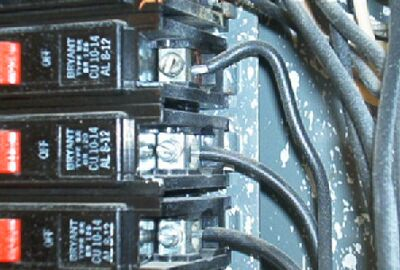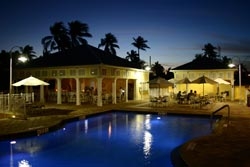|
Aluminum
wiring

|
Aluminum wiring, used in some homes from the mid 1960's to the early 1980's, is
a potential fire hazard. How safe is aluminum wiring? According to the U.S.
Consumer Product Safety Commission, fires and even deaths have been reported to
have been caused by this hazard. Problems due to expansion, or more likely
micro-fretting and arcing at the connectors, can cause overheating at
connections between the wire and devices (switches and outlets) or at splices.
The connections can become hot enough to start a fire without ever tripping a
circuit breaker!
CPSC research shows that "homes wired with aluminum wire manufactured before
1982 are 55 times more likely to have one or more connections reach "Fire Hazard
Conditions" than are homes wired with copper. "Post 1982" aluminum wire is also
a concern. Introduction of the aluminum wire "alloys" in 1982 time frame did not
solve most of the connection failure problems. Aluminum wiring is still
permitted and used for certain applications, including residential service
entrance wiring and single-purpose higher amperage circuits such as 240V air
conditioning or electric range circuits. The fire risk from single purpose
circuits is much less than for branch circuits. But it's not necessarily because
of a "new alloy" as some folks assert. It's because there are enormously fewer
connections (four or six rather than 30 or 40 per circuit) and thus
statistically a smaller chance of a connection failure. These connections do
still burn up, as indicated by field reports
How to Reduce the Risk in Buildings with Aluminum Electrical Wiring
Immediate Actions for Safety
-
See if you have aluminum (solid conductor
branch circuit) wiring installed in your home. Aluminum wiring
identification tips are provided below.
-
If there are signs of wiring failure, such
as flickering lights, turn off the circuit involved and call a licensed
electrician. See U.S. CPSC 516 (linked-to below) for other trouble
signs.
-
Install smoke detectors.
-
Repair the aluminum wiring: once the initial
steps above have been addressed.
-
Re-wire the Building replacing all aluminum
branch circuit wiring with copper, as a "best repair method" for
aluminum wiring, OR as a next-best aluminum wiring repair method,
-
COPALUM: Use the special AMP (now TYCO)
COPALUM connector and special tool to connect short copper wires to
every aluminum wire end in the Building, reconnecting the copper to the
various devices (outlets, switches, lights) and splices. This "copper
pigtailing" procedure is performed by an electrician trained and
licensed by AMP or TYCO to use this COPALUM procedure. The TYCO COPALUM
connector method is described in detail below. Typically this approach
costs about half that of completely re-wiring a home with copper.
Currently only the two remedies above have been formally recommended by
the CPSC. Emergency temporary repairs necessary to keep an essential
circuit in service might be possible following other procedures
described by the CPSC.
-
Scotchlok 3M Special Method: For locations
where the CPSC-recommended AMP/TYCO COPALUM aluminum wiring repair
method is not available, an alternative, "Scotchlok 3M connector"
special installation method is described in an article linked-to below.
-
Other methods - not recommended: Warnings
regarding other "repair" methods which are not recommended are discussed
below, such as the Ideal 65 purple "Twister" connector, receptacles and
outlets marked "COALR" (even if these worked, which has not been
demonstrated, what about all of the other electrical connections and
splices in the Building?) and others.
Martin County: (772) 214-9929 Broward/Palm Beach Counties: (954) 340-6615
Email me at:
ev@magnuminspections.com
(Back to Top)

